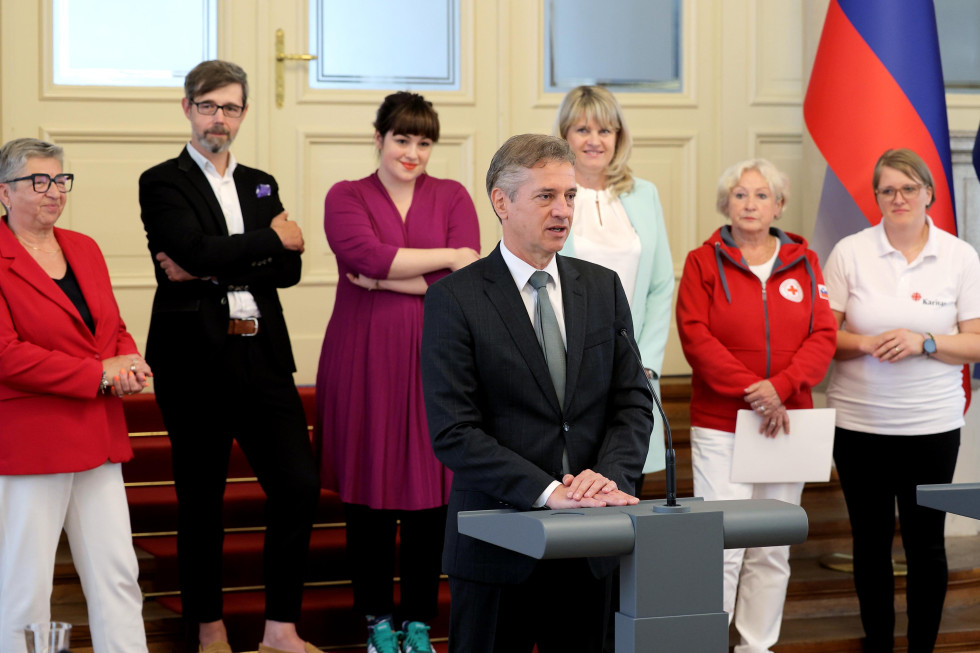Prime Minister Golob: "Social policy and the welfare state are this Government’s top priorities"
Prime Minister Golob accepted the invitation to hold the meeting in order to listen to the experiences, knowledge and voices of those who work with people on a daily basis. Representatives of social and humanitarian organisations have valuable insight into the lives of individuals and communities, which makes their contribution essential to strengthening and improving the welfare state.
In his statement to the media after the meeting, the Prime Minister highlighted that social policy and the welfare state are the top priorities of the current coalition and Government. "Building a public social network includes everything – from public education and healthcare to the pension system," said the Prime Minister, adding that a significant progress had been achieved over the past two years in terms of systemic measures, reforms and legislation. He stressed that the role of social and humanitarian organisations is invaluable due to their direct contact with vulnerable groups in need of support. "I would like to thank you personally for the work you do," he said and called for a partnership in support of a stronger welfare state.
"I have listened carefully to all the proposals presented today, which are aimed at helping people. I believe that together with all the organisations present at today's meeting, as well as others, we will be able to shape these proposals into an appropriate form and then implement them," he added.
Prime Minister Golob thanked all participants in today's meeting and welcomed the proposals aimed at improving the lives of people. The participants also agreed on the next meeting to discuss some of the proposals in more detail. "We welcome this partnership. It will improve the functioning of the whole of society."
Some representatives of participating organisations also gave their statements to the media.
President of the Slovenian Red Cross Ana Žerjal expressed her satisfaction with today's meeting. On behalf of the organisation, she presented two proposals related to pensions and the amendments to the Food Act.
Mojca Kepic from Caritas Slovenia thanked the Prime Minister for the financial assistance provided by the Government through Caritas Slovenia and the Slovenian Red Cross for people affected by the floods.
The Slovenian Association of Friends of Youth was represented by its Secretary-General, Breda Krašna, who outlined many systemic and specific initiatives focused on protecting the most vulnerable – children.
The Centre for Information Service, Co-operation and Development of NGOs was represented by its Director, Goran Forbici. He stressed that it is imperative that the Government and the organisations reach a shared understanding that the welfare state and social well-being form the foundations of this country and our society, even if they have different views on certain issues. "Not only because a welfare state is one that supports each of us in times of need, but also because the rule of law and democracy stand or fall on this as well, as we have witnessed around the world in recent years," he added.
Nika Kovač, Director of the 8th of March Institute, presented the institute's proposal for free-of-charge learning aids and the care for the most vulnerable groups of our society.
On behalf of the charitable association Društvo Palčica Pomagalčica, Larisa Štoka thanked the Prime Minister and the Government for listening to the case of developing genetic medicine for the boy Urban and responding with the "Urban Act". "They not only opened doors, but also their hearts and they listened. In a very short time, the Scientific Research and Innovation Activity Act was amended so that it allows state funding for the final stages of medicine development for children with rare diseases. This medicine will be available free of charge to many other children, those living among us today and those yet to be born. I believe that we are not yet entirely aware of the significance of this step," said Larisa Štoka.
Since the start of its term of office, the Government has adopted a series of measures to improve the status of the most vulnerable, such as the regular and extraordinary indexation of pensions, guaranteed widow(er)’s pension, a new pension base calculation method for disabled workers, energy bonus for pensioners and people with disabilities, inflation allowance, investments in the network of homes for the elderly, the limitation of costs of complementary healthcare insurance, and, in particular, measures aimed at ensuring high-quality and accessible public healthcare for all citizens. The Government is also stepping up the implementation of the Long-Term Care Act.
Prime Minister Golob has reiterated many times that in the next term, the Government will continue to build Slovenia on four pillars, and that its first priority will be strengthening the welfare state designed for Slovenians, as it is the welfare state that unites the nation.
For this meeting, the Office of the Prime Minister invited organisations that have direct contact with people and daily on-the-ground experience, as their insights provide a valuable understanding of the specific challenges and needs of society. It should be noted that in all stages of policy development, the Office of the Prime Minister and competent ministries regularly work together with framework organisations and other representative associations, in accordance with the content and context of the subject concerned.


